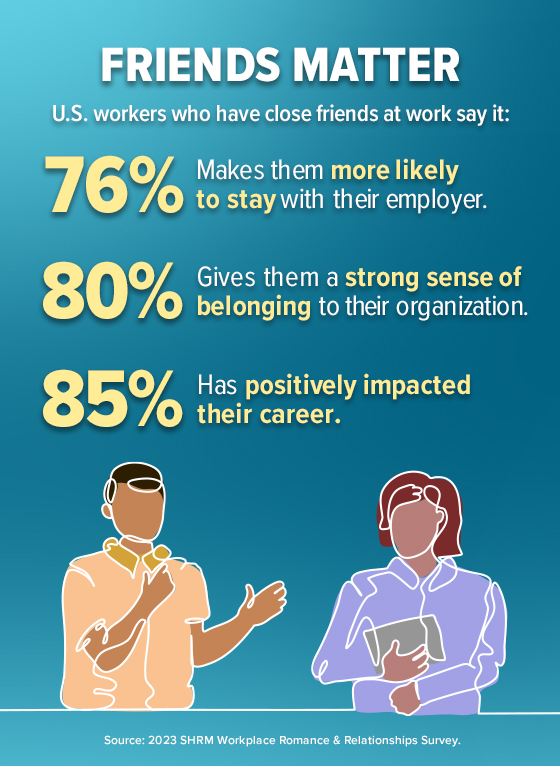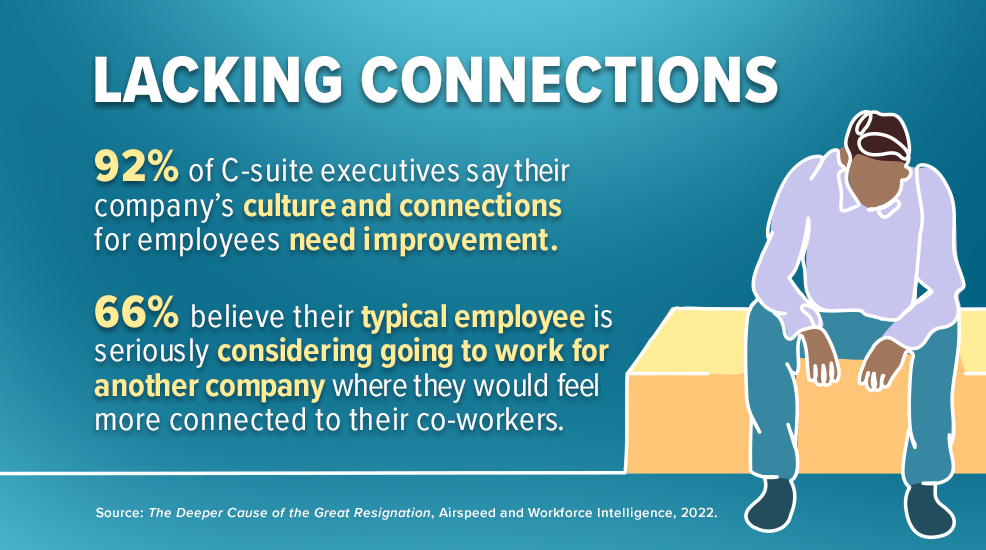For millions of employees, remote work has been life-changing. Many women, along with Generation X employees who are now approaching middle age, say the ability to work remotely ranks higher than compensation and benefits when they consider what makes them happy about their jobs. Among Generation X employees, remote work also ranked above having a great boss, a positive workplace culture and career-growth prospects, according to research from global technology and talent consultancy MSH.
While people clearly value working remotely, it can come at a personal cost, as a growing number of employees say they feel isolated from their employers and colleagues. Even employees who regularly work in the office can feel lonely. In fact, about 8 out of 10 employees (82 percent) say they have felt lonely at work, according to a 2022 survey of more than 5,000 workers in Brazil, China, Germany, the U.K. and the U.S. conducted by consulting firm EY.
Lonely employees are more likely to feel dissatisfied and burned out at work. And loneliness also drags down employee performance and commitment, according to research from the University of Pennsylvania’s Wharton School and California State University (CSU).
But companies that provide meaningful support and encourage connections may have a competitive advantage. New research from the Society for Human Resource Management (SHRM) shows that close companionships at work can have a significant positive impact on a person’s career, job satisfaction, sense of belonging and more.
“Today’s workers expect much more than just a competitive salary and good benefits—they want to feel a true sense of belonging and community,” says Dan Schawbel, managing partner of research and advisory firm Workplace Intelligence.
C-Suite Challenges
Concerns about employee loneliness and isolation have reached the C-suite. Two out of 3 executives believe workers may soon quit their jobs because of how disconnected they feel, according to a survey conducted last year by Airspeed, a social platform firm, and Workplace Intelligence. And those concerns appear to be justified, as being disconnected also was cited as the top reason why employees said they would leave their jobs at fully remote or hybrid organizations.
‘Employers need to create a strong culture of connection in order to engage and retain employees, or they’ll risk losing their best employees at a time when most can’t afford to do so.’
Doug Camplejohn
In addition, more than 90 percent of executives said culture and connection are lacking for their remote team members. At the same time, more than 70 percent of workers don’t feel like they are able to socialize enough when working remotely.
Among the workers surveyed by EY, 46 percent indicated they are likely to leave their job because of loneliness. This sentiment was particularly strong among members of Generation Z (54 percent) and Millennials (52 percent). Among members of Generation X and Baby Boomers, 42 percent and 31 percent, respectively, said they’re likely to leave an employer if they felt lonely.
“The transition to remote work has been immensely challenging for businesses and their employees,” says Doug Camplejohn, the founder and CEO of Airspeed. “Employers need to create a strong culture of connection in order to engage and retain employees, or they’ll risk losing their best employees at a time when most can’t afford to do so.”
The 2023 SHRM Workplace Romance & Relationships Survey found that organizations that encourage friendships may have a competitive edge: increased retention rates. According to the survey, 76 percent of U.S. workers who have close friends at work say it makes them more likely to remain with their employer. And 25 percent of U.S. workers who have close friends at work say that if their friend left their job, they would consider leaving too.

The SHRM survey also found that:
- 85 percent of U.S. workers who have close friends at work say it has positively impacted their career.
- U.S. workers who have close friends at work are significantly more likely to say they feel a strong sense of belonging to their organization (80 percent) than those without close friends at work (63 percent).
- U.S. workers who have close friends at work are significantly more likely to say they are satisfied with their job (86 percent) than those without close friends at work (74 percent).
Alone in a Crowd
However, isolation and loneliness can affect all employees, not just remote and hybrid workers. An employee does not have to be alone to feel lonely, according to the Wharton School and CSU study. “[L]onely employees can be lonely even when interacting frequently with many others,” the study authors wrote “… Whether employees feel lonely depends on the level of closeness, security and support they seek in their interpersonal relationships. Thus, the same work environment could fulfill the interpersonal needs of some employees while leaving other employees lonely.”
In EY’s survey, 40 percent of global respondents said a lack of face-to-face interactions with co-workers was a main contributor to their sense of work-related loneliness.
“They’re lacking meaningful connections,” says Karyn Twaronite, EY’s global vice chair of diversity, equity and inclusiveness. “People are talking about work transactions. What is missing is calling up people saying, ‘How are things? Is there anything you need?’ “
Co-workers want to know that you care, she adds: “It’s not overly complicated.”
Loneliness also has a big impact on one’s overall health, says Jennifer Moss, author of Unlocking Happiness at Work (Kogan Page, 2016) and co-founder of Plasticity Labs, a research and consulting company that focuses on organizational culture. “Loneliness is as impactful on our health as smoking 15 cigarettes a day,” she says. “It’s worse than diabetes.”
Creating Connectedness
To combat loneliness, it’s crucial for colleagues to pay attention to one another. “Relationships are so important to our sense of connection at work. They are the building blocks of any successful organization,” says Brent Pearson, founder and CEO of Enboarder, an employee communication and workflow platform.
When it comes to relationship building, an Enboarder survey found that U.S. workers credit their co-workers—more so than their managers—with helping them feel connected in the workplace. Only 30 percent of both Millennials and members of Generation Z credited their managers for making the biggest difference in their sense of feeling connected to the workplace.
‘Relationships are so important to our sense of connection at work. They are the building blocks of any successful organization.’
Brent Pearson
A slightly higher percentage of EY’s global respondents (36 percent) say that having a boss ask how they are doing personally and professionally can make them feel less lonely and contribute to their sense of belonging.
The actions of a leader can be as simple as inviting someone outside one’s core team to join a meeting, Twaronite suggested in a CNBC opinion piece. “I also ask my team members to have virtual coffee or lunch once a week with a new colleague,” she wrote. “It’s good practice to expand your horizons and can also build new friendships.”
Other strategies to promote connections and belonging include the following:
- Offer employee resource groups (ERGs). “People really value affinity,” Twaronite says. While an ERG can be built around gender, sexual orientation and/or cultural aspects, employers should also consider other themes. Some organizations have ERGs targeting parents, young professionals and military veterans.
- Provide specific, real-time feedback to employees. That can be meaningful, according to Twaronite. “If you pay attention to my work and I know it … at least I know if you care if I come to work, you care about me as a person,” she says. “People still want the one-on-one approach.”
- Give individuals your full attention when asking how they are doing. “Don’t multitask while you’re doing it; don’t be on your phone. There are some pretty dismissive power tactics [you] can eliminate,” Twaronite says. “You absolutely have to be authentic.”
- Give everyone—not just those who are the loudest or for whom English is their first language—a chance to be heard. Don’t forget about team members who are in different time zones and make sure they’re included in meetings. Being able to speak out about concerns matters. EY found that 46 percent of global workers overall say they feel a sense of belonging because of being able to freely voice their opinions, even when their opinions differ from those of others.

Stephen Miller, CEBS, is a freelance writer in Arlington, Va., who specializes in compensation and benefits issues. Kathy Gurchiek is associate editor for SHRM’s HR News.
Explore Further
SHRM provides resources and information to help business leaders ensure workers have opportunities to make connections at work.

